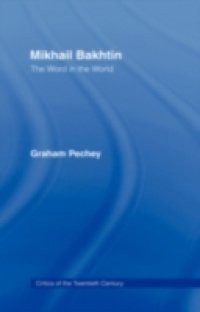Mikhail Bakhtin is one of the most influential theorists of philosophy as well as literary studies. His work on dialogue and discourse has changed the way in which we read texts - both literary and cultural - leading to the idea in twentieth-century thought whereby literature is understood to be a form of ethically charged knowledge and philosophy a form of creative writing, the attributes of 'play' and truth' being a monopoly of neither exclusively but rather variously exhibited in both. In this book Graham Pechey offers a commentary on Bakhtin's texts in all their complex and allusive 'textuality', keeping a sense throughout of the historical setting in which they were written and of his own interpretation of and response to them. Examining Bakhtin's relationship to Russian Formalism and Soviet Marxism, Pechey focuses in on two major interests: the influence of Eastern Orthodox Christianity upon his thinking; and Bakhtin's use of literary criticism and hermeneutics as ways of 'doing philosophy by other means'.

